All about growing cucumbers in buckets
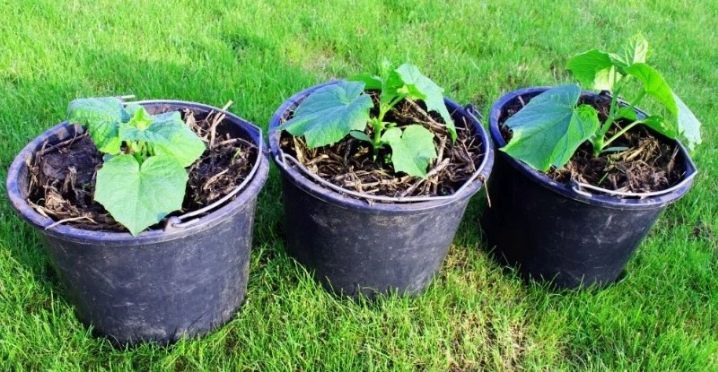
Many summer residents are engaged in the cultivation of cucumbers. These vegetables are not only delicious, but also very healthy. There are many ways to plant cucumbers. In today's article, we will learn all about growing these plants in buckets.
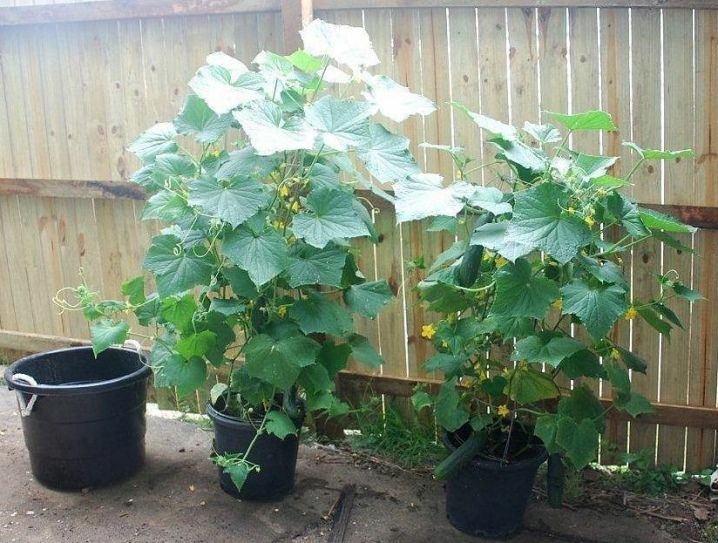
Advantages and disadvantages
Different people grow vegetables differently on their plots. There are many techniques for certain crops. So, fragrant and juicy cucumbers can be grown in buckets. This method is not always used by everyone, but this does not mean its failure. Usually summer residents undertake to grow vegetables in buckets for an experiment. Done right, it ends up with a rich and healthy harvest.
Growing cucumbers in buckets is an interesting agricultural technique that has its advantages and disadvantages. Before turning to it, it is advisable to familiarize yourself with the first and the second.

First, let's find out what the main advantages of the method under consideration are.
- The location of growing crops does not does not bind to the beds. Vegetables in buckets can be easily placed on the balcony or loggia, placed next to the gazebo or in any other comfortable place.
- When the cucumbers are grown in buckets, each individual plant is cared for individually and carefully. Thanks to this, it is possible to achieve high yields.
- With the considered landing method you can get a high-quality and earlier harvest.
- If cucumbers are grown in buckets placed on the balcony area, then people have the opportunity obtaining environmentally friendly and fresh fruits, not treated with various chemicals and means.
- The method of planting cucumbers under consideration should be addressed, if you do not want to worry about the correctness of the crop rotation, the correspondence of the predecessor plants.
- When cucumbers grow in buckets, it is much easier and more convenient to care for them. In addition, in such conditions, plants are easier to defend against various diseases or parasite attacks.
- Plants that grow in buckets can get more uniform illumination.
- Thanks to the method under consideration, the summer resident can significantly save free space. This is especially important if the plot in the country is small.
- Even when it rains, the fruits in the buckets stay clean.... Dirty earth clods do not stick to them.
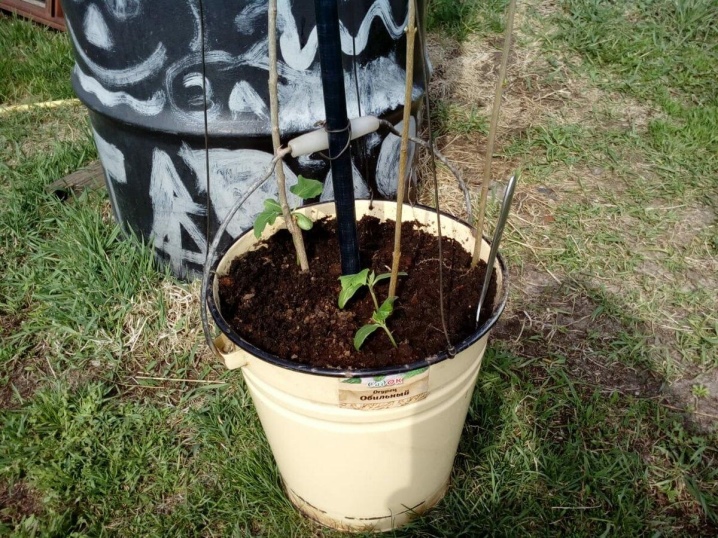
Growing cucumbers in buckets is a process that has many advantages, but the gardener should be aware of its disadvantages as well.
- If the plants are grown in buckets, the fruiting period will be shortened.... This is due to the rather rapid depletion of the soil in the container.
- It is necessary to carry out preparatory work... The summer resident has to prepare the substrate, find suitable forms. All this takes a lot of time and effort.
- Number of planted stems with this method it usually turns out not very big.
- This method of planting and growing requires tireless attention and control from a person.... Plants need to be constantly cared for in order to achieve a good harvest.
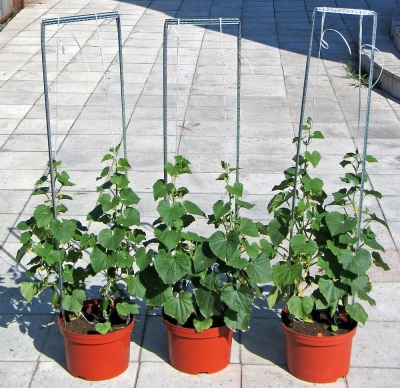
You can grow cucumbers in buckets as an addition to the main standard beds. This option cannot completely replace the traditional method of growing.
However, in the conditions of city apartments, the method under consideration remains the only measure that allows you to get your own eco-friendly crop.
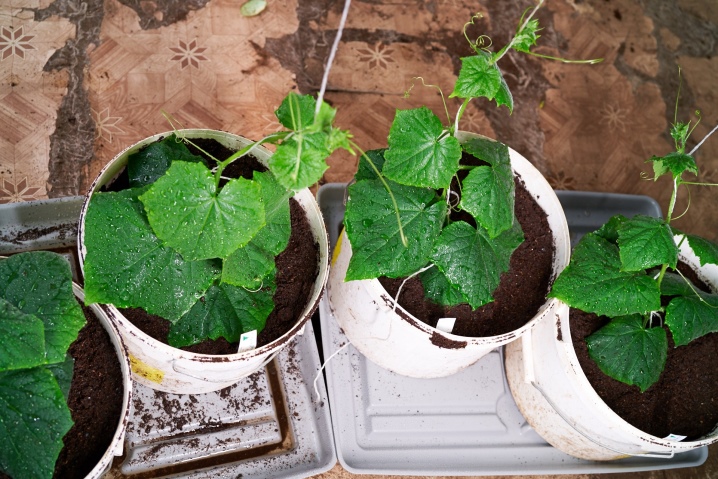
Suitable varieties
To grow vegetables in buckets, it is important to choose the right varieties correctly. There are a lot of them, so it can be difficult to quickly select the optimal planting materials.
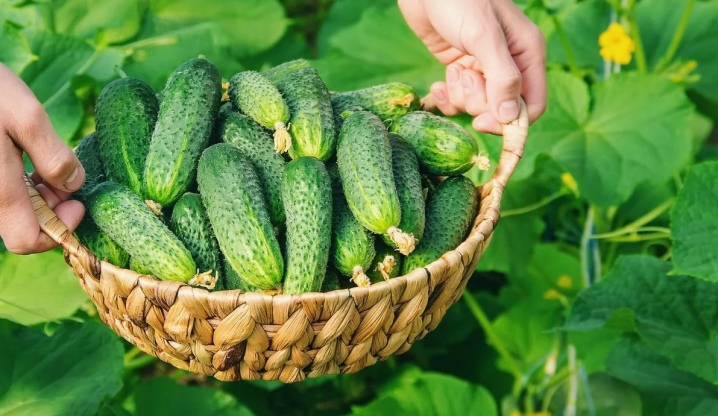
When choosing good varieties of cucumbers for planting in buckets, you need to consider how they may differ from each other. First of all, you should pay attention to the timing of the ripening of the culture:
- the growing season of early cucumbers usually ranges from 30 to 32 days;
- there are varieties with an average ripening period of 40 to 50 days;
- late varieties grow only 50 days after germination.
Another important parameter in choosing a variety is the type of pollination:
- there are self-pollinated varieties;
- pollinated by bees.
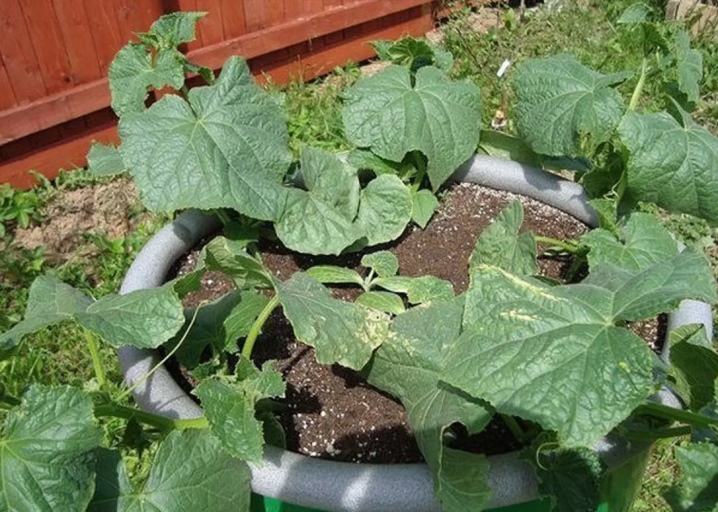
The varieties also differ in the purpose of the fruit and in their size.
There are such varieties:
- salad;
- canning and pickling;
- universal.
In addition, cucumber varieties can differ in terms of yield, type of fruiting, shape and even color of the fruit.
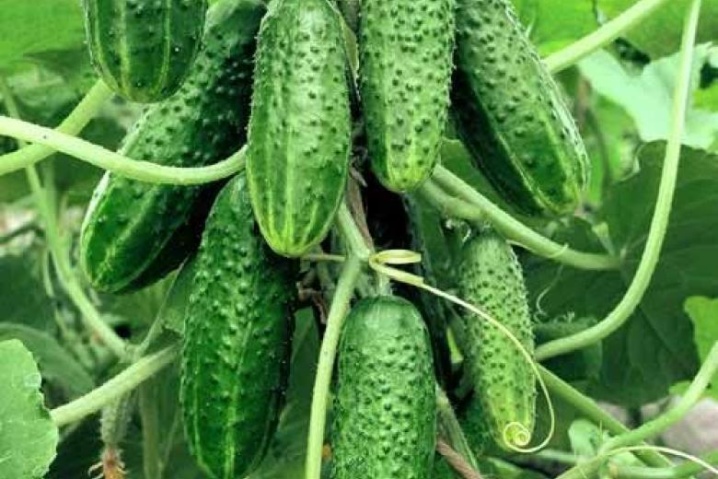
For growing cucumbers in buckets, containers or other types of containers, it is recommended to choose hybrid varieties characterized by the following parameters:
- early ripening;
- high productivity;
- prolonged fruiting;
- the presence of small fruits with salad or universal taste;
- female form of flowering;
- resistance to most common diseases.
Bush or bush varieties are ideal here.
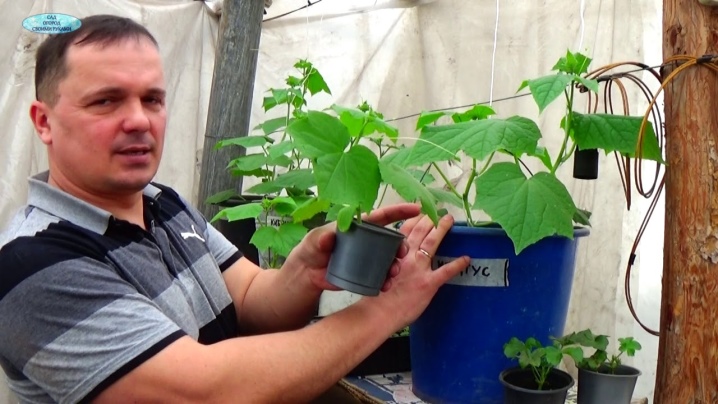
The following popular hybrids are an excellent solution:
- F1 "Moscow delicacy";
- F1 "Tearaway";
- F1 "Cellar";
- F1 "Dasha".
The listed cucumber varieties bear aromatic and tasty fruits. Their fruiting begins on the 36th day. Yields can reach up to 17 kg per bush.
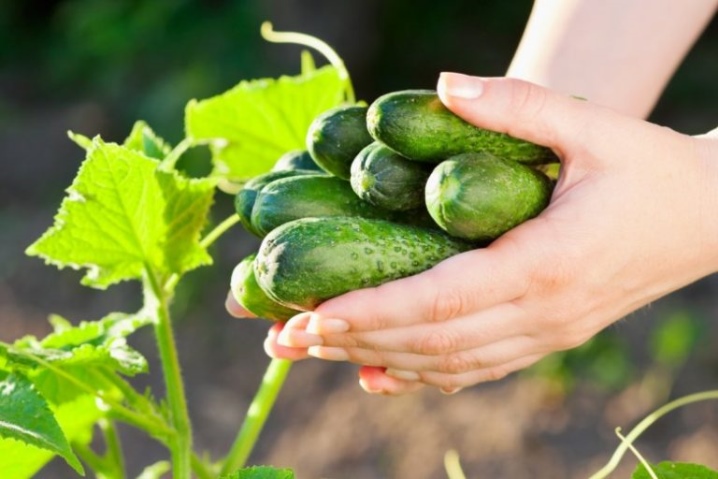
Preparation
Before planting the seed, the gardener must definitely attend to the preparatory procedures. It is very important to choose and prepare a container correctly, as well as prepare a suitable soil. Let's find out how to do it correctly.
Capacity
For the cultivation method under consideration, almost any type of container can be suitable. The main thing is that their volume is no more than 5 liters. You can use plastic containers. Beforehand, it is worth improving them a little: make drainage holes on the sides and at the bottom.
The gardener can use the following types of containers for planting cucumbers:
- old unnecessary buckets;
- cut cans;
- plastic containers;
- barrels.
To plant cucumbers, it is recommended to choose tanks with a wide diameter. In such a container, the risk of damage to plants during care activities will be reduced to a minimum. At the bottom of the selected container, it is imperative to lay out a drainage layer made up of river pebbles or ordinary expanded clay.
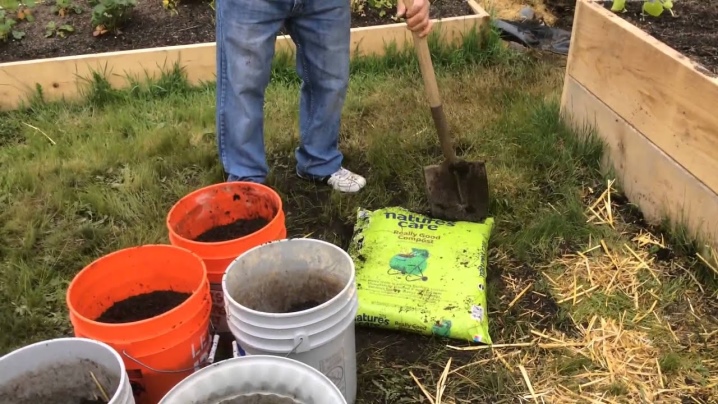
Priming
It is very important to properly prepare not only the tank, but also the soil in which delicious and eco-friendly vegetables will grow. You can buy planting mixture for cucumbers at a specialty store, or you can prepare it yourself. The best option for the culture in question is the soil obtained during mixing in equal proportions of the following components:
- sand;
- humus;
- manure;
- turf.
It must be remembered that self-prepared soil must first be disinfected. For this, the earth is sent to the oven for 20 minutes. In this case, it is worth setting the temperature at 200 degrees Celsius.
These measures are required to prevent possible fungal diseases. Almost any ingredient from the composition of the earth can be their source.
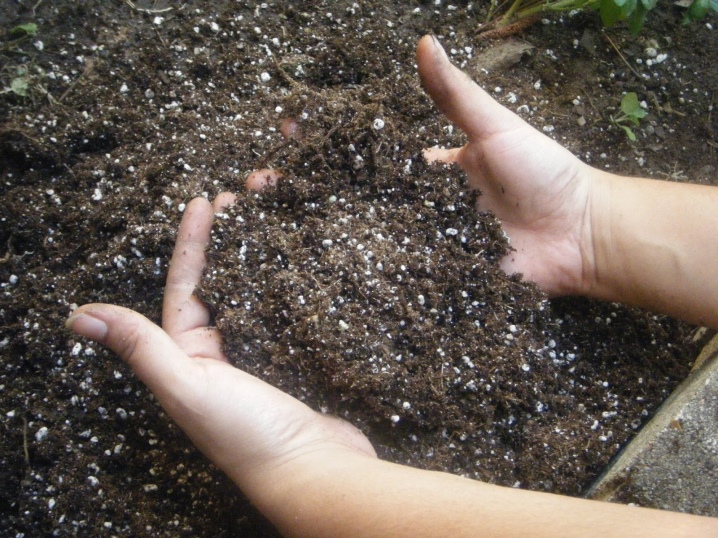
To saturate the purchased planting soil mixture with the necessary nutrients, any complex type fertilizer should be applied. It is worth diluting 10 liters of top dressing in 10 liters of water.The prepared liquid should be watered at the rate of 1 liter for each 10-liter tank.
Landing technology
When both the container and the earth are ready, you can proceed directly to planting healthy vegetables. You must purchase cucumber seeds. You can use seed from your own stock. It is highly recommended to engage in pre-sowing disinfection and treatment.
You will need to prepare a light pink solution of potassium permanganate. Cucumber seeds should be dipped into it. Then they are wrapped with a gauze layer, left for 15-20 minutes. After that, the seed is rinsed in clean running water.
Before direct planting, it is advisable to calibrate and germinate seeds. It is worth selecting the largest specimens. They are placed in a saucer covered with gauze or cotton cloth. From above, everything is poured with warm water. The liquid should cover the seeds. Then they are covered with material, and then they are monitored so that there is no drying out. The material is left in this way until shoots form. After that, the seeds are very carefully washed and dried.
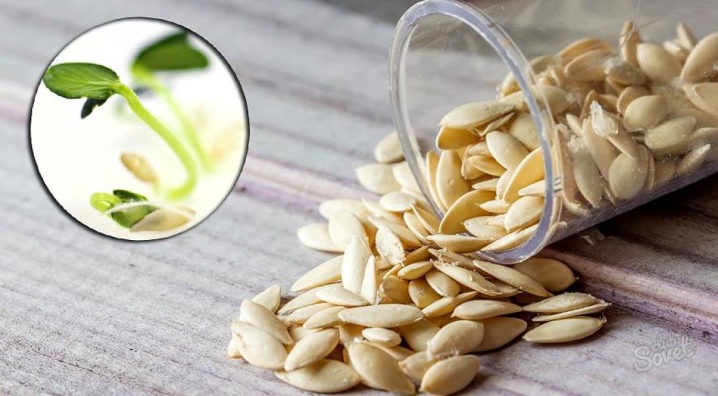
Let's consider step by step how to properly plant cucumber seeds in buckets in prepared soil.
- In each tank, exposed on the east or south side, it is necessary to plant 3-5 seeds. They should be buried about 3 cm into the ground.
- If absolutely all the seedlings sprout, then they are allowed plant by referring to the picking procedure.
- Upon completion of the sowing procedures, it is necessary to carry out moderate watering.
- In order to maintain an optimal moisture level in the ground, it is permissible to put a plastic bottle filled with water in the tank. In the latter, several holes must be made.
As soon as the first shoots hatch, it is necessary to put supporting components in order to tie them up. For these purposes, wire arcs, stretched ropes, and so on are suitable. The selection of the support base entirely depends on the wishes and capabilities of the gardener.
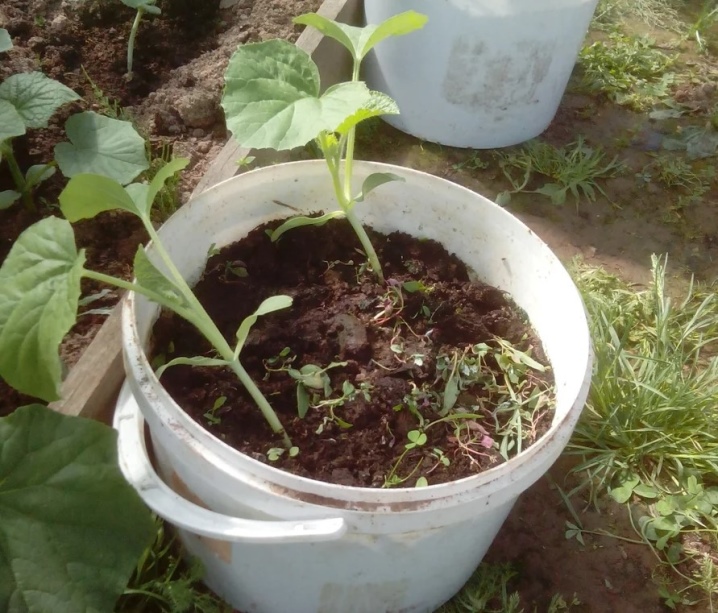
Care
To grow healthy and wholesome cucumbers in buckets, the summer resident needs to provide them with proper care. It should be borne in mind that plants growing in such conditions need to be looked after in a different way than with standard agricultural technology. For example, bushes in buckets do not require formation using the pinching technique, because with proper selection of seeds, the lashes will not grow too long.
Obligatory weeding of plantings is also excluded. If the soil was prepared carefully and efficiently, then the rudiments of all weeds in it will be initially removed. All this greatly simplifies the process of caring for vegetables.
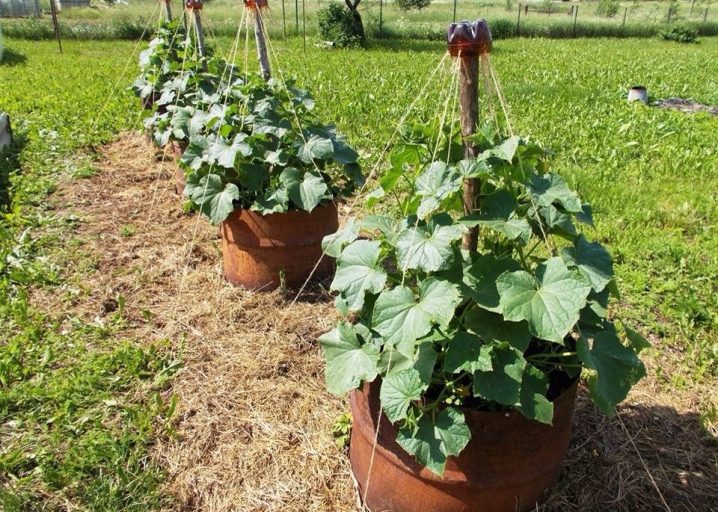
Consider the basic grooming procedures that bucket-grown cucumbers will need.
- Culture must get enough light, therefore, containers are recommended to be displayed indoors or outdoors on the sunny side. If necessary, you can use lamps, especially during the development of seedlings.
- The soil mixture in the tanks should not dry out. Watering in containers should be more frequent, since moisture consumption is accelerated. Only warm water should be used for irrigation.
- Plants will need sprinkling. Cucumbers need such a procedure, they respond very well to it.
- To increase aeration, soil loosening will be required... Due to this, the plantings will be saturated with oxygen, ailments of a fungal nature will not arise. Around the stalks, it is worth adding additional soil or hilling the existing soil to prevent the roots from exposing.
- In order for the ovaries to form, the cucumbers must be fed with an infusion of ash... It is prepared by dissolving 100 g of wood ash in each liter of water. The mixture is left for a day, after which root feeding of vegetables is carried out.
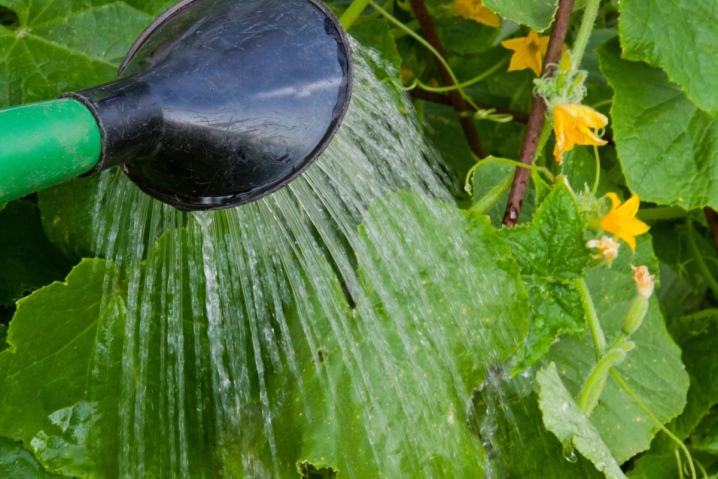
Harvesting
Harvesting cucumbers grown in buckets at home or in the garden is carried out as needed. The frequency of picking ripe cucumbers largely depends on what size they have reached. The immediate yield of the selected variety also plays an important role. It is recommended to harvest early in the morning or in the evening, when the sun has already set.
When picking ripe cucumbers in buckets, you should be very careful, since leaving vegetables on the hinges can lead to overripening and yellowing. This will stop the formation of fresh ovaries.

It is advisable to check the presence of zelents every day. The collection is recommended to be carried out at least 1 time in a couple of days. At the same time, the gardener should not twist the vines: this can seriously injure them. Fruits that have traces of deformation must be removed immediately so that planting does not waste nutrients on the stupid development of a poor-quality crop. The cucumbers should be removed without touching the stem.
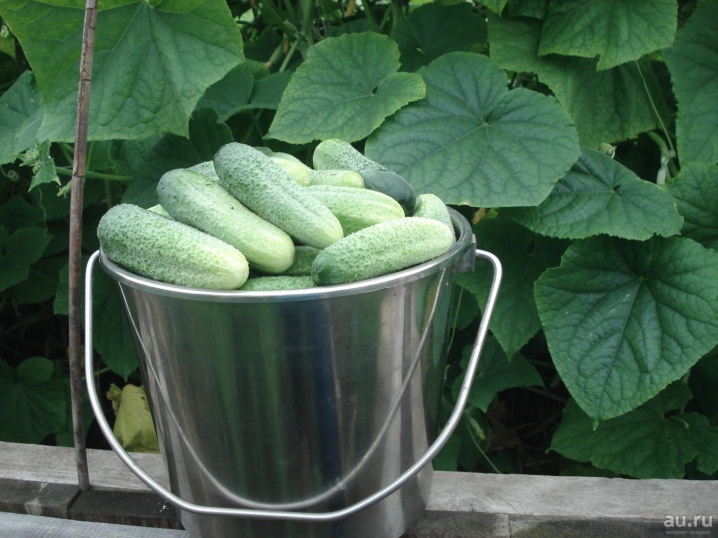













The comment was sent successfully.